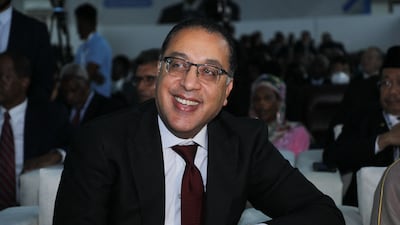Egyptian prime minister Mostafa Madbouly announced on Wednesday that his government plans to offer stakes in 32 state-owned enterprises from now until the end of the first quarter of 2024.
He told a news conference that they include three banks and two military-owned companies.
The companies will be offered to individual and “strategic” investors, he added.
The companies are 12 more than what Mr Madbouly said last week would be available in initial public offerings.
The banks are Banqu Du Caire, Arab African International Bank and United Bank of Egypt. The two military-owned companies are Safi, which produces bottled mineral water, and Wataniyah, a nationwide chain of petrol stations.
He said the companies cover activity in 18 economic sectors, including energy, transport, electricity and insurance.

IPOs of at least 25 per cent of these companies will be carried out in the next six months, said Mr Madbouly.
Egypt has for years spoken about privatising state-owned companies, but the plan took on added urgency following the outbreak of the Russia-Ukraine war nearly a year ago, which has had a devastating impact on the nation's economy.
The coronavirus pandemic also affected Egypt severely and its economic problems include a foreign currency crunch and double-digit inflation. Its currency has lost about 50 per cent of its value since March last year.
“This is a step that confirms the seriousness of the state in doing what it has pledged to do,” said the prime minister.
“This is a cash flow situation,” Rami El Dokany, chairman of the Egyptian Stock Exchange told The National in an interview earlier this week. “Once the cash flow has been resolved, we’re going to see more interest, and more inflows happening.
“I think the IPO programme will play a big role in making things happen.”

Egypt in December agreed to a $3 billion rescue plan with the International Monetary Fund. The deal is contingent on the country introducing a flexible foreign exchange regime and reducing the state's footprint in the economy to allow more room for the private sector.
Mr Madbouly's announcement came one day after Moody's Investors Service downgraded Egypt's credit rating to B3 from B2, owing to what it called the country's reduced external buffers and shock absorption capacity as it pursues economic reforms and structural changes.
The country's outlook was changed to stable from negative, it said.
The rating downgrade, which takes Egypt deeper into junk territory, takes place as the most populous Arab nation strives to move towards a more export, and private sector-led growth model under a flexible exchange rate regime.
Moody's said the Egyptian government's state-owned asset sale strategy will support its structural adjustment and help generate sustained non-debt creating capital inflows to meet increased external debt service payments over the next two years.
Egypt’s foreign debt is thought to be more than $150 billion, making it one of the most indebted countries in the Middle East.


